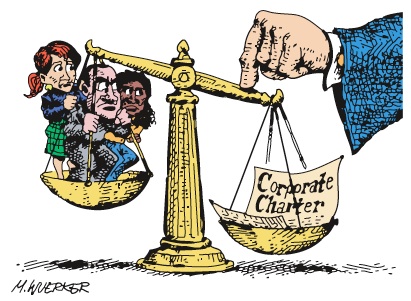Feature photo by Susan-q-yin-Ctaj
The Price of Rights
Ever notice when you ask your local elected officials to stop some noxious corporate project — like a frack well, a dump, the eighth warehouse to further undermine your local quality of life — they blink and say, “we wish we could help, but our hands are tied”?
Yeah. It’s really annoying. When you dig into it you’ll find that it’s no mystery why they say it. First thing they do when the elected municipal officers get done hemming and hawing and dropping phrases like “we’ll look into it” is . . they turn to the municipal attorney to ask “can we do that?” That being the thing you want them to do: ban the horrible project by denying the company the permits they need to get started.
Whether in executive session or in open meeting, the lawyer’s answer is pretty blunt. “You can’t ban that.” That being the noxious project you definitely want to ban. The municipal attorney calmly explains how if your town denies the project the permits, or bans it outright with a local law, corporate lawyers will suddenly appear to warn your officials about the lawsuit that’ll be filed against the municipality for interfering with state authority or, even more crazy, violating the civil rights of the corporation.

You say, “What civil rights violation? We’re not discriminating against the corporation’s race, gender, or religion. It doesn’t have any.” But, yep, since 1886 the Supreme Court has been giving corporate property “personhood” status with Bill of Rights protections.
If your little municipality were to deny a corporation the privilege of using its property to make money, it could be considered a violation of the Fifth Amendment’s prohibition against the government taking private property without compensation. That means if you prohibit the corporate investors from reaping a profit by trashing your community, your municipality would have to pay them whatever amount they would have made had they not been stopped. Most local governments can’t afford that. And they can’t afford a protracted legal battle either.
So it’s no surprise that the legal advice your local officials receive from the attorney working for the municipality convinces them that it would be too expensive to protect your and your neighbors’ rights, or the health of your local environment. That’s a squinch unfair, wouldn’t you say?
“Our Knife’s Got Your Back!”
The municipal attorney will have more advice for your local officials. They’ll tell them they can’t stop the nasty corporate project because the state has forbidden the municipality from regulating anything having to do with the corporation’s business. When the state puts the brakes on local legislation, it’s called “preemption,” and it’s based on the claim that your municipality is just a subordinate subdivision of your state, which has “occupied the regulatory field.” That means that, at some point, your professed representatives in the state legislature have made it illegal for your local officials to protect you from harmful corporate behavior.
It’s telling that in the mid-twentieth century, state legislatures began building preemptions of local law into the legal codes ostensibly intended to regulate corporate behavior. In other words, the same laws that legalize industrial assaults on your community outlaw your municipality from doing anything about it.

So why are the local officials that you elected to represent your community’s interests accepting legal advice not to represent your interests? For one thing, because the municipal attorney’s job is to represent the best interests of their client, and their client isn’t you and the rest of the community. It’s the municipality – a municipal corporation chartered and owned by your state. So when the attorney determines it would cost the state’s municipality too much to fend off a corporate lawsuit, and that, anyway, the state has guaranteed the corporation would win in court by enacting the preemptive law in the first place, the interests of the people and of the state’s municipality have come to loggerheads.
Sounds like some priorities are jumbled. Wouldn’t you say?”
A Modest Proposal
“What’s that?” you ask. “The municipal attorney was hired to represent the state’s municipal corporation and not the people?” The straight answer is: that’s right. So if the officials elected to represent the people take the municipal attorney’s legal advice, explaining why they wish they could help but their hands are tied, then the people of the municipality will have no voice, no representation in government whatsoever, and they may as well have stayed home on election day. Forget about democracy; they are being denied even a republican form of government.
There aren’t any orthodox legal strategies to escape from under this SNAFU, but there is a way to meet the challenge with integrity. Here’s the plan:
- Start by acting on the premise that you and your community have always had the legitimate right and authority to make and enforce local laws when they protect and enhance the rights of the people.
- Educate your local elected officials. They generally aren’t lawyers and they don’t understand how taking legal advice from the municipal attorney sometimes amounts to a betrayal of the community they are supposed to serve. They and not the attorney were elected to represent the people. The final decision is theirs, and if they choose to side with the municipal lawyer against the people’s interests, they are likely violating their oath of office, which generally requires them to protect the health, safety, and welfare of the community. In other words, their client is the people; the attorney’s client is a municipal corporation. When the interests of those two clients are at odds, the duty of the elected officials is unambiguously toward the people and the community.
- Propose a local law that asserts the rights of the community and persuade your newly-educated local representatives to adopt it and enforce it. How? By organizing your neighbors and as much of the community as you can muster to the cause to remind those empowered to run your local government just who they work for. And if they refuse to obey the will of the people and instead choose obedience to the state and service to wealthy corporate elites, demand their resignations, loudly and publicly.
- Prepare to stand and defend your community, your right of community local self-government, and your right not to have your rights violated, even if the state says it’s made it legal for corporations to inflict community harm by issuing permits to let it happen.
- If you live in a home rule municipality, or if your state constitution guarantees the right of local initiative, that is, to petition a proposed law onto the ballot for the local voters to decide, then get busy familiarizing yourself with the process and get to work educating your neighbors about how the state legalized a corporate assault on your community. Get their signatures, file the petitions on time, and be prepared for further shenanigans. Everyone from the corporate attorneys, the state-appointed board of elections, the Chamber of Commerce, and the industry’s lobbying group will try to stop the measure from appearing on the ballot. And if they fail, then expect the law to be challenged after the people enact it.
- In victory or defeat, teach others what you’ve learned. Encourage them to do likewise. We don’t need more obedient victims; we need more confident champions of the rights of our communities.
- Don’t stop there. You don’t lose until you quit. Organize community alternatives to the rigged system. Hold people’s assemblies. Make and publicize decisions that the community adopts. Elect people to represent the community who understand and value that they are sworn to actually represent it. Refuse to be complacent. Refuse to be complicit. Refuse to be irrelevant.

Life is full of hard choices. It’s plain dishonest for your local elected officials to say they can’t do anything to protect the community because it would go against the advice of legal counsel. The fear of costly lawsuits – and blind obedience to state laws that make it legal for them to ignore the rights of their constituents and violate their oaths of office – is no excuse for cowardice, especially when lined up against losing viable farmland or poisoning the air and water or denying a real sustainable economic future. What the moment calls for is courage and character.
If your local officials believe they are legally bound to protect the ability of corporations to have a free-hand at harming you and your community, then they have no claim on your respect, nor any business campaigning for re-election, and you ought to let ‘em know it. Wouldn’t you say?



